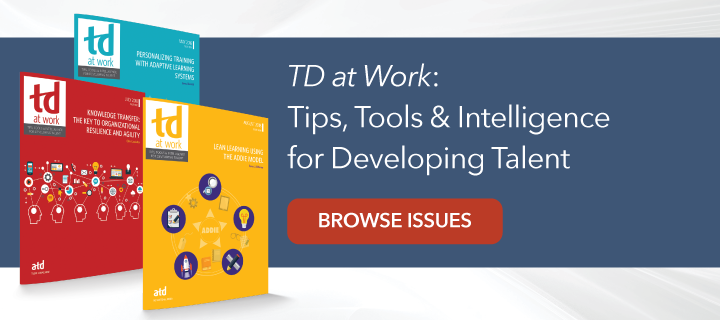How much thought do you give to finding yourself a mentor? Would you know where to begin? Would you know how to ask someone to serve as your mentor?
In “Embrace Mentorships,” Jenn Labin offers advice especially for talent development professionals, though the tips work for anyone who is seeking a mentor to help with some facet of their professional or personal development.
Get As Much Clarity As Possible
Before asking someone to mentor you—helping to guide you by asking questions and sharing their insight—know why you want a mentor in that professional or personal area and why you’ve asked that person. “A great way to gain clarity on your mentoring desires is to outline a few specific developmental goals with which you would like a mentor to help you,” Labin writes. Start with some broad ideas then add details and your intention and purpose. Why do you want to develop yourself in that area?Reaching Out to a Potential Mentor
Once you’ve determined a goal, it’s time to reach out to someone with expertise in that area. Where do you start? Take out pen and paper (or an electronic format) and list people in your network. What do you admire about these people? Do you have someone on that list with expertise that aligns with your developmental goal? Or someone who is connected with an individual with such prowess?- How will you reach out to your potential mentor? How you approach the person you want to be your mentor will vary depending on the type of relationship you have. Is the relationship generally a virtual one? If so, it probably makes sense to send an email or a message via LinkedIn. If you’re seeking a mentor in the personal realm and a neighbor has parenting skills you admire, it probably makes sense to have a face-to-face conversation.
- What exactly are you asking for? Rather than simply saying, “I’d like you to be my mentor,” be able to explain to your potential mentor why you’re asking them, what you hope to gain, and the time commitment you’re considering. These details will make it easier for the other person to know if they’re the right individual to be your mentor at this time.
- How are you asking? Just because your contact is willing and able to devote time to serve as your mentor doesn’t mean they want to waste their time. Make sure you relay that you’re excited about developing yourself in the area you’re asking about and that you’re willing to do the work. Be enthusiastic about the joint effort. It’ll be contagious.
Starting Out
While it may feel awkward to have the conversation, it’s better to come to a mutual understanding about confidentiality, honesty, and the boundaries of the mentorship. Further, it may feel like such things as meeting frequency, session length, and agenda will naturally “happen.” Don’t go there. Write down in a mentoring agreement what each person expects from the relationship.As the mentoring work ensues, make sure you live up to your commitment to do the work between the mentoring sessions. Whether that’s reading, role-playing, or reflecting, the time between the mentoring sessions is when most of the hard work gets done.
Ending the Mentoring Relationship
Each person should have the ability to end the relationship early if it’s not working out for them—for example, if one of them is not showing up on time for the agreed-upon meetings. Managing expectations from the start should help reduce these instances.When your developmental goal has been reached or the initial agreed-upon time for the relationship has come to an end, acknowledge it. Will you continue to keep in touch, just in a different capacity? Are both of you willing to move onto another goal and stay in a mentoring relationship? Will the communication cease? Whichever is the case, before you move on, celebrate the success and hard work.




